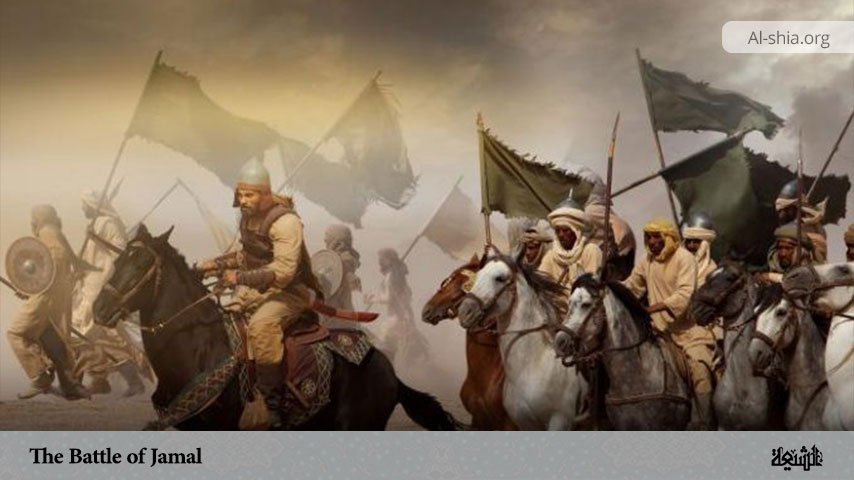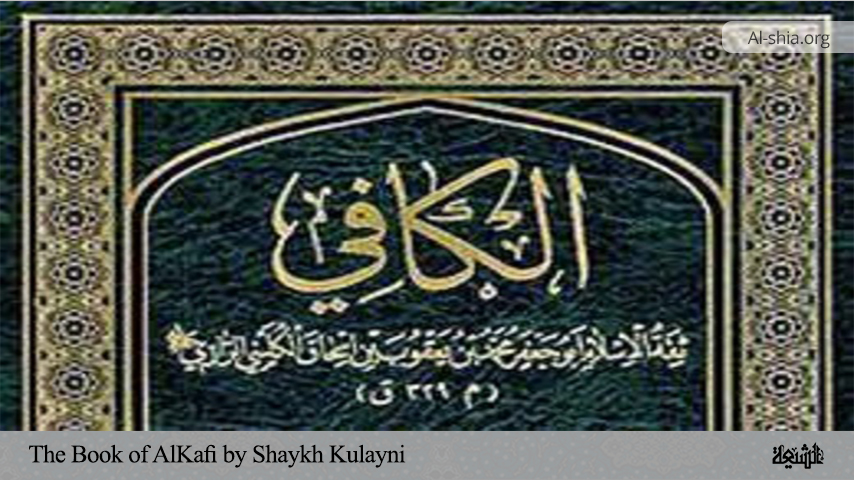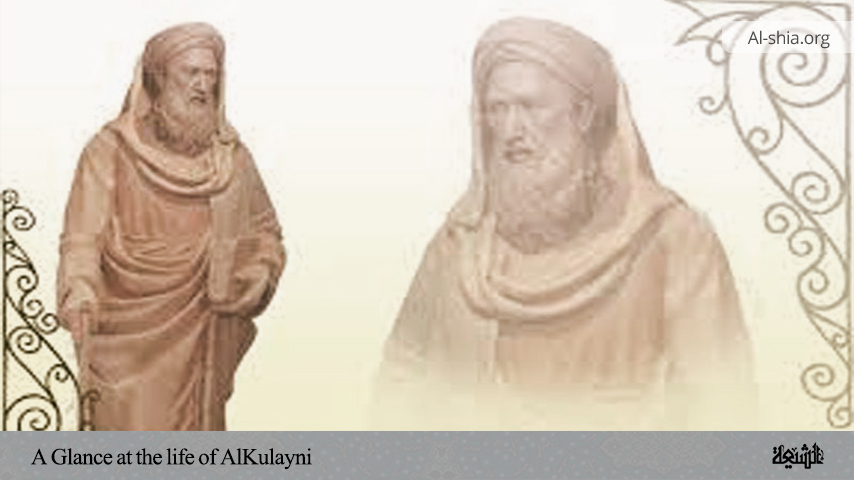The Battle of Jamal (Battle of the Camel), is the second civil war in Islam. The first civil war was waged by the government against some of its dissident subjects during the caliphate of Abu Bakr ibn Abi Quhafa; the second civil war was waged by some of the dissident subjects against their government. It was a war that took place between the Oath-breakers and the army of Imam Ali (peace be upon him) during the caliphate of the Commander of the Faithful, Ali ibn Abi Talib in 36 AH/656 CE. The Arabic term “Jamal” means male camel; the battle became famous as the Battle of Camel because Aisha was riding a male camel in this battle. It is pertinent to mention that the battle is also known as the Battle of Basra.
After breaking their allegiance to Ali, Ṭalha and Zubair went to Basra with Aisha until they reached the well of Abu Musa near Basra, where they stopped and sent a letter to Uthman ibn Hanīf, the appointed governor of Basra by Ali. They sent a letter, in which it was written, “Leave the government house and the government of Basra to us!”
Uthman ibn Hanīf asked for Abu al-Aswad Du’alī and sent him along with a man named Imrān ibn Haṣīn Khazā’ī to have discussions with the pledge breakers. The two of them moved and reached the camp of Ṭalha, Zubair and Aisha. Initially, they went to Aisha, warned her, reminded her of Allah and made her swear to stop this act, which would lead to nothing but sedition, chaos and bloodshed. Aisha, therefore, directed them to discuss with Ṭalha and Zubair.
They got up from Aisha and came to Zubair who said thus: “We have come to seek the [revenge] over the blood of Uthman, and we want to invite the people to vote for the caliphate, and whoever the people choose for themselves will be the Caliph.”
The two of them thereafter came to Ṭalha, but they found him more hard-hearted and determined to create sedition and start a battle. Thus, the two later returned to Uthman ibn Hanīf and informed him about the matter. After this incident, Ṭalha and Zubair came to Basra and committed a terrible crime there. Four hundred guards were beheaded that day, and this was the first beheading that happened in Islam. The treachery of the pledge breakers with Uthman ibn Hanīf was also considered the first treachery done in Islam.
After hearing the unfortunate news and the crimes committed by the pledge breakers in the city of Basra, the Commander of the Faithful left Medina and came to Dhi Qar and from there, he moved towards Basra along with an army that was prepared from Kufa and some other cities of Hijaz and Iraq.
When the news of the Commander of the Faithful’s departure reached Aisha, Ṭalha and Zubair, they removed their army, came out of Basra and the two armies met each other at a place called Qasr Ubaidullah ibn Ziyad. As the historians have documented, the two parties stayed there for three days without a battle, and these three days were for the exchange of messages that Ali sent to Zubair in particular through Ibn Abbas, he said to Zubair: “You knew me well in Hijaz but you don’t know me now in Iraq? What matter has happened?” And he instructed Ibn Abbas not to meet with Ṭalha because he is like a cow whose horns are wrapped and tightened and will not submit to the truth.
When the two parties were ready for the battle, Ali invited Zubair and told him: “Woe to you, O Zubair! What motivated you to come here?” He said: “Uthman’s blood” Ali said: “May Allah destroy each one of us who was having hands in the shedding of Uthman’s blood.”
Then he continued his speech and said: “O Zubair, do you remember the day when you hugged me and the Messenger of Allah (PBUHH) saw that scene and said to you: “Do you love him?” You said in response: “How can I not love someone who is my brother and cousin?” At that time, the Messenger of Allah (PBUHH) said to you: “But know that in the future, you will be at war with him while you are oppressing him.” Zubair, who heard this, beseeched Allah for forgiveness and said: “Inna Lillahi wa inna ilaehi Rā’jiun”, meaning, “From Allah, we come and unto Him, we shall return”. You have reminded me of something that I forgot. He [Zubair] said this and returned to his troops.
Zubair said: “If you had reminded me of this story before, I would not have been with this army. I will not fight with you now” and he withdrew from the army and went outside Basra, where his grave is today, a place is known with his name “Zubair” and is part of Basra province. He was killed by Amr son of Jurmuz.
In the historic book of Ṭabarī and others, it is stated that before the Battle of the Camel, Ali took a copy of the Qur’an in his hand and brought it in front of his companions and supporters and he said: “Who will take this Qur’an and invite these people [i.e., the pledge breakers] to what is in it? And he shall be martyred.”
A young man from Kufa who was wearing a white robe got up and said: “I will.” And the Commander of the Faithful gave him the Qur’an and the young man took it and stood in front of Aisha’s army and invited them to act according to it. At that moment, according to Ibn A’tham Kūfī, one of Aisha’s servants came forward and cut off his hand and he held the Qur’an with his other hand, they cut off that hand too and the blood was pouring on his white robe, and he held the Qur’an with his teeth but he was martyred with another strike of the sword. It was at this moment that Ali said: “Now fighting with them has become obligatory!”
Ali handed the flag to his son, Muhammad Hanafiyah and said: “If the mountains are removed from a place, take its place! Grind your teeth and leave your skull to Allah! Keep your feet on the ground and your eyes on the shore of the army, and do not allow fear over you, and know that victory is from Allah.”
Ali’s troops won this battle. Talha and a few people from the Quraysh and the Umayyah families were killed. The forelimbs and legs of the camel were cut off and Aisha fell to the ground. However, no one disrespected her. With the death of the camel, which was like a war flag, the conflict ended and the rebels were defeated.
The fighters hoped to benefit from its spoils after the fire of war subsided, just like the battle they had participated in or had heard about. But Ali told them not to take anything from the property of the dead. It was here that a group said: “How can their blood be lawful for us while their wealth is forbidden?”
They did not know or did not want to know that these were tyrannical Muslims and not militant infidels. It has been documented, that the foundation of the Kharijites’ belief was laid in this war. After the end of the war, the Imam took the oath of allegiance from the people of Basra.
When Ali (PBUH) arrived at the death of Talha, he said: “Abu Muhammad has remained a stranger here. By Allah! I do not like the Quraysh to fall under the stars. I took my grudge against Bani Abd al-Manaf and the leaders of Bani Jumah. They raised their necks for what they did not deserve. They had to break their necks and arrest them.”
Malik Ashtar bought a camel for seven hundred dirhams, sent it to Aisha, and told her that I sent this camel to replace the camel that was killed in the battle. Aisha replied: “May Allah not bless him, he killed the great Arab (Talha’s son) and did whatever he wanted with my niece.” When this message reached Ashtar, he raised his sleeve and said: “They wanted to kill me. I had no choice but to do what I did.”
And thus, the battle and the killing of six thousand or ten thousand Muslims ended. When Ali came out from Aisha, a man from the Azad tribe said: “By God, this woman should not be left freely.” Ali got angry and said: “Shut up. Don’t open a curtain and don’t enter a house and wake up a woman even if she curses you and calls you a foolish leader because they can’t resist. In Jahiliyyah, we were ordered not to touch women.”
Ali sent Aisha from Basra to Medina, gave her what she needed for the trip, and accompanied her with forty highly distinguished women from Basra. Aisha left for Medina. Ali said about her: “But that woman, she possesses a feminine thought, and hatred burned in her chest like a blacksmith’s mountain. If they asked her to do, what she did to me, she would not do it to anyone else, and she would not rush like that. In any case, her honor should be preserved and her reckoning is with Allah.






